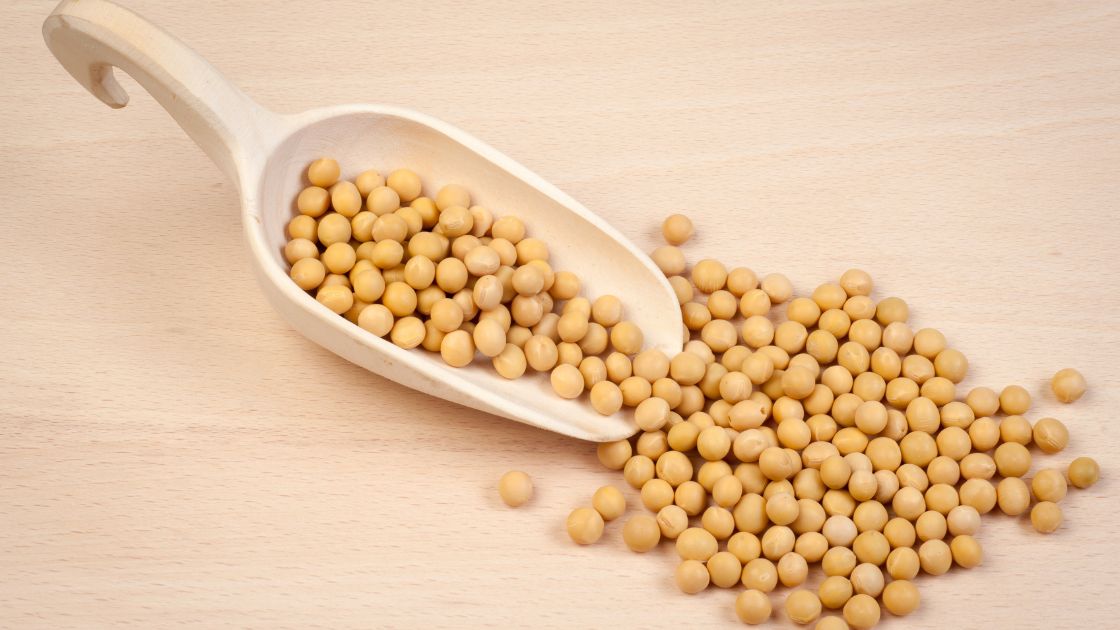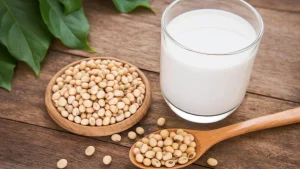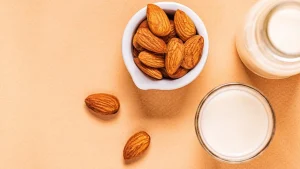Perhaps you’ve heard of hype surrounding soy protein. As the world is becoming more conscious of the cruelty towards animal proteins, health gurus are looking for alternative solutions. Enter soybeans – a part of the legume family.
They are a great source of protein, fiber, and other nutrients that can play a role in your healthy diet.
In this blog post, we’ll discuss some of the health benefits of soybeans and how they can improve your overall health if you’re following an alkaline diet (or not). We’ll cover topics such as soy’s role in reducing the risk of breast cancer, its impact on weight loss, and the antioxidants it contains. We will also look at two simple recipes you can try, especially if you are yet unfamiliar with soyfoods.
By learning more about the importance and health benefits of soybeans, you can make sure you’re taking full advantage of this nutrient-rich food. So read on to learn more about soybeans and their role in your diet.
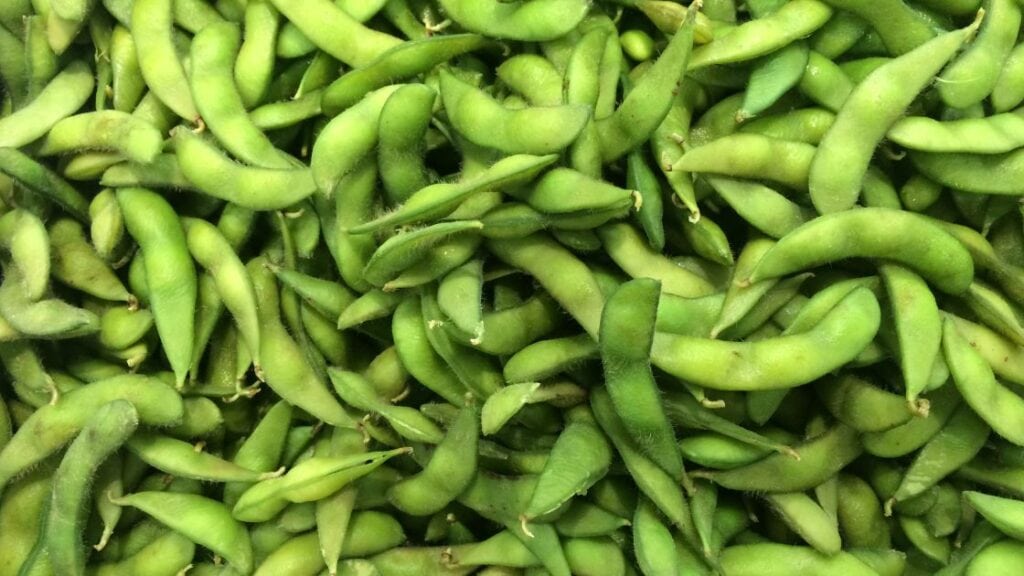
Physical Description
Soybean production is booming! Soya beans (as they are more commonly known) have a woody, pod-like appearance, but they are actually comprised of individual fruits. The fruit contains the soybean seed and is surrounded by a thick, leathery outer covering (the pericarp). The pericarps are usually green or yellow and can be harvested when they reach maturity. Soybeans come in various sizes and shapes, depending on the variety. They can be round, oval, or flat. Their pods can be long and thin or short and wide.
History and Production
Soybeans have a long history in the food industry especially because of their high protein content. They can be used to create soybean oils, protein supplements, and even animal feed. Soybeans are also used in industrial applications, such as resin production and oil-refining processes. Soy flour is an excellent substitute for regular flour and contains less gluten and carbs. And then we even have soy milk, a yummy, but lactose-free option.
The history of soybeans dates back centuries and was even used in China to treat symptoms of menopause. They were also used in Indian medicine to treat certain conditions such as arthritis and certain types of cancer. Many of these traditional uses have been supported by scientific evidence, suggesting that soy food products have numerous health effects.
As for their more practical uses, American Agricultural Facts had this to say:
“Soybeans are used in ink, plastic, textiles, candles, and so much more!”
What Is the pH Scale?
You can expect an alkaline-forming diet to contain a lot of fresh produce, protein, and fiber. It also limits processed foods and excess sugar and fat. On the other hand, an acidic-forming diet tends to consist of more processed foods, including meats and dairy products. As we have mentioned, soya makes for the perfect meat substitute, along with tofu.
The pH of soybeans for an alkaline diet can be anywhere from 5.8 – 6.2. It is ever so slightly acidic because soybeans contain both acidic and alkaline compounds. The acidity of the soybeans helps to balance the pH of your diet by providing you with a base to neutralize the acids in the food. However, it is important to keep in mind that an alkaline diet should also include other sources of minerals and vitamins to ensure that all essential nutrients are provided.
Nutritional Facts About Soybeans
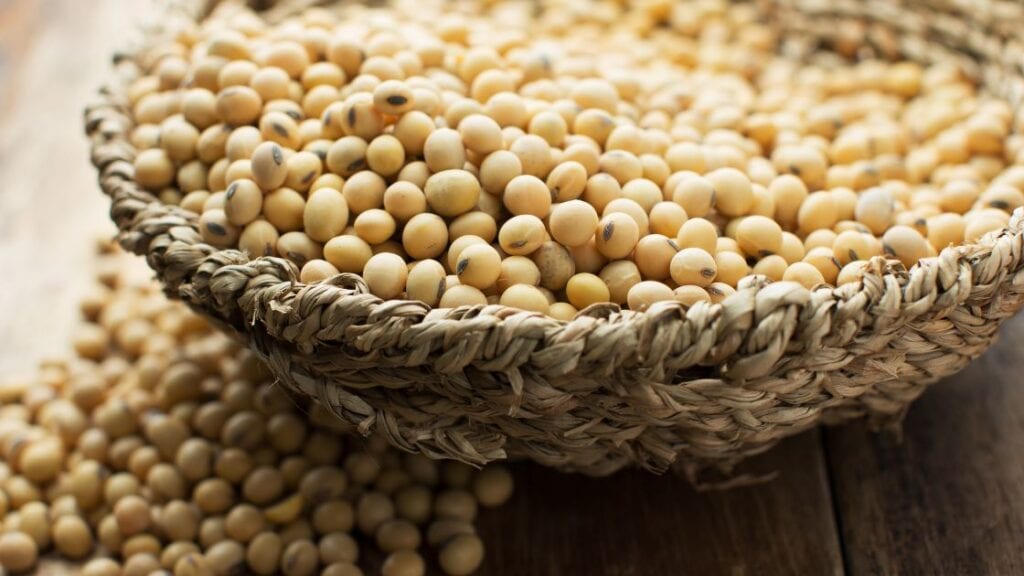
As we’ve mentioned, soy-based products are high in protein and contain other important nutrients. Below are just some nutritional facts about 100g of Soybean servings.
- Fiber – 6g
- Iron – 15.7mg
- Protein – 16.6
- vitamins K1 – 87mcg
- B6 – 0.4mg
- Calcium – 277mg
- Magnesium – 280mg
- Potassium – 1797mg
- Calories – 173g
- Carbohydrates – 9.9g
- Fat – 9g
Benefits of Soybeans
Soybeans are nutritional powerhouses! They’re high in fiber and protein, which can help you feel fuller and more energized. They’re also low in fat and cholesterol, making them a healthy choice for those with heart or blood pressure concerns. In addition to their health benefits, soybean plants are also environmentally friendly. They’re produced using less water and land than other crops, reducing the risk of deforestation and climate change.
A typical soybean meal is rich in antioxidants, polyunsaturated fats, and isoflavone supplements. This has proven health benefits, including reducing the risk of cardiovascular disease and certain forms of cancer. These factors make soybeans a valuable addition to your diet if you are looking to improve your health and well-being.
So whether you’re looking for a nutritious and eco-friendly snack or ingredient, consider including soy products in your diet!
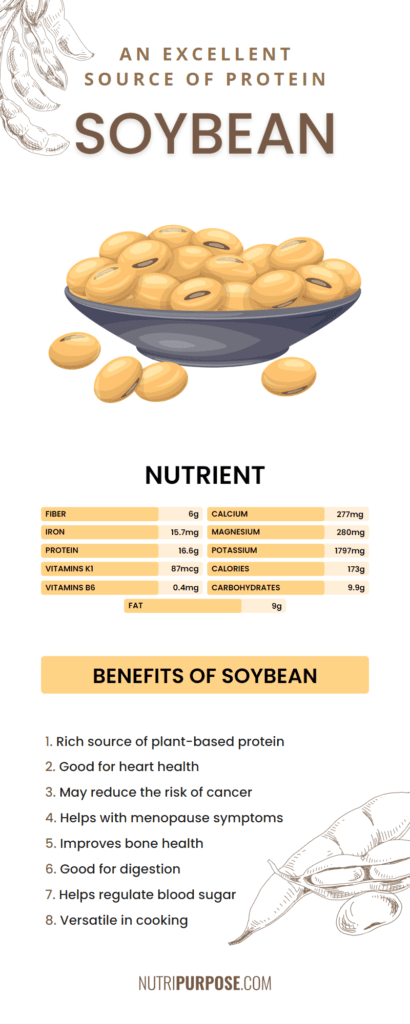
Copy this code and placed it at your Website:
<a href="https://nutripurpose.com/soybeans/"><img style="width:100%;" src="https://nutripurpose.com/wp-content/uploads/2023/02/Soy-beans.png"></a><br>Read More <a href="https://nutripurpose.com/soybeans/">Soybeans</a>List of Benefits
In addition to their nutritional value, soybeans have several health benefits;
- They contain isoflavones (plant compounds that have a similar chemical structure to estrogen). Phytoestrogen may help to reduce the risk of certain types of cancer.
- Soybeans are also rich in omega-3 fatty acids, which are beneficial for cardiovascular health.
- Some dietitians believe that consuming soy products may help lower triglyceride levels and improve blood cholesterol profiles.
- Good source of calcium and zinc, which are important for maintaining strong bones and immune function.
- They are known for their high content of protein and fiber, which can help to keep us feeling full and satisfied.
Soybean Recipes
Soybeans have a neutral taste and can be used in a variety of dishes from around the world. Use them fresh in salads or cooked into soups, stews, stir-fries, or other dishes. They make an excellent replacement for meat or dairy products. They also make tasty additions to baked goods such as cookies, muffins, and bread as well as smoothies and other blended foods.
Soybean Falafel

Soybean falafel is a delicious and nutritious dish made from ground soybeans. It can be used as a versatile protein source in vegetarian and vegan dishes.
Ingredients:
- 1 cup ground soybeans
- 2 tablespoons olive oil or vegetable oil, divided
- 1 large onion, finely chopped
- 3 garlic cloves, minced
- 1 teaspoon cumin seeds
- ½ teaspoon smoked paprika (paprika de árbol) and ½ teaspoon chili powder)
Instructions:
Mix the ground soybeans and 2 tablespoons of olive oil in a bowl. In a large skillet or wok, heat the remaining 1 tablespoon of oil over medium-high heat. Add the onion and garlic and cook for 5 minutes until softened. Stir in the cumin seeds and smoked paprika and chili powder, then pour in the ground soybeans mixture. Cook for 3–5 minutes until heated through.
Soybean Ragu

Soybean ragu is an Italian-inspired dish made with soybeans, tomatoes, and herbs. It is often served over pasta, but could also be served on its own as a vegetarian dinner.
Ingredients:
- 1 can (15 oz) soybeans, drained and rinsed
- 3 cloves garlic, minced
- 2 teaspoons olive oil or vegetable oil
- 1/2 cup chopped onion
- 1 large tomato, peeled and diced small
- 11⁄2 teaspoons dried basil leaves or 1 tablespoon fresh basil leaves finely chopped
- Salt and pepper to taste
Instructions:
In a large saucepan, heat the oil over medium-high heat. Add the onion and cook until softened, about 5 minutes. Add the garlic and continue to cook for another minute.
Stir in the soybeans and tomato, mixing well to combine. Bring to a simmer and cook until heated through (about 10 minutes). Stir in basil leaves or parsley, oregano leaves, salt, and pepper (to taste). Serve warm over pasta of your choice.
It is worth a mention that some people can be prone to a soy allergy. If you are prone to a nut or bean allergy, you are better of to look for a soy alternative.
Substitute With Soya
What makes soybeans the perfect addition to an alkaline diet is not just their nutritional value. Most legumes are naturally highly acidic, so soybeans are one of the only legumes safe for an alkaline diet.
Consuming more soybeans can help you reach your health and fitness goals, while also providing you with the essential nutrients your body needs. If you’re interested in incorporating soybeans into your alkaline diet, be sure to try out one of our easy recipes!

I am a professional health and nutrition writer with extensive experience in the industry. My passion for sharing valuable insights on nutrition and wellness stems from over 15 years of personal training and maintaining a healthy lifestyle. My commitment to continuously educate myself on the latest trends and research in the field allows me to deliver high-quality content that is informative and engaging. My mission is to empower individuals to make informed decisions about their health and well-being through my writing.
